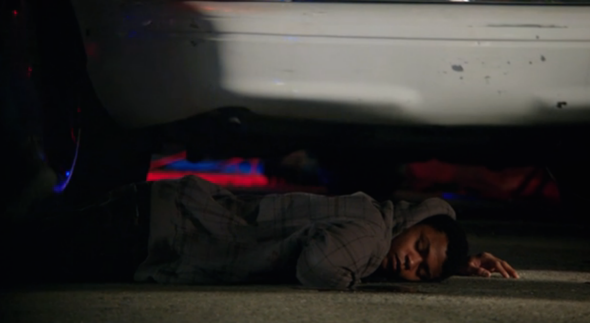Upon learning that last night’s episode of Scandal, “The Lawn Chair,” would have a plot echoing the death of Michael Brown in Ferguson, my immediate fear was that this would look like a Law & Order episode: A ripped-from-the headlines storyline that lasts just about 42 minutes, hastily covering as many angles of an incredibly fraught and complicated subject through some wooden, on-the-nose dialogue. The guest actors would be hammy and overwrought (think Pablo Schreiber’s several-episode arc as a sociopath out to terrorize Captain Olivia Benson on SVU), and there would inevitably be a tense scene involving a standoff with an armed suspect.
Now that I’ve watched “The Lawn Chair,” I can say that it is and it isn’t a Law & Order episode. It certainly plays like a police procedural, beginning with a teenaged black boy, Brandon, lying dead in the street just a few miles away from the White House, at the hands of a white officer. Then his father, Clarence (Courtney B. Vance) arrives on the scene with a shotgun, demanding to know who shot his son. Olivia Pope must then negotiate with Clarence, a black activist named Marcus, the police chief, and her connections at the White House over the course of about 24 hours, to keep tensions down and Clarence alive.
But Scandal, as ridiculous and frustrating as it usually is, does succeed in adding nuance in a way Law & Order can rarely muster: For perhaps the first time on the show, Olivia is forced to fully grapple with her complicated role as a black woman serving the mostly white federal government. Having both Marcus and the white police chief question where her loyalties lie makes for an interesting study of Olivia’s place in the world around her. It’s not often that Scandal addresses how complicated Olivia’s role is as a black woman with so much and yet so little power, and how it affects her; here, the show does a good job of this.
But enough praise—Scandal still falls painfully short of making the Ferguson-inspired theme sufficiently complex. It reduces the shooting and the subsequent fallout to a problem that can still be easily “handled,” in the words of Olivia Pope. At one point, Olivia breaks down in front of her frenemy attorney general David Rosen, saying this is the one thing she can’t fix. And then, of course, she and her gladiators go and fix it. While reviewing the surveillance footage of Brandon’s shooting, Quinn and Huck somehow discover that the cop, Officer Newton, already had a different suspect in the back of his car for a separate crime when he stopped Brandon, and planted that suspect’s knife on Brandon’s body, in exchange for letting him off. (The suspect, by the way, is white.)
It turns out that Brandon, who “matched the description” of a person suspected of shoplifting a cellphone, was reaching for his receipt to show the officer, not a knife, as Newton had claimed. Just like that, Brandon is exonerated, Newton reveals himself for the pompous, bigoted cop he really is in an impassioned monologue that could have come straight from Rudy Giuliani’s lips, and Clarence, who by now has been standing guard over his dead son’s body with a shotgun for many hours, doesn’t face any charges. (In fact, he gets to meet President Fitz—who never publicly comments on the events that took place walking distance from his office—and then cry on his shoulder.)
Scandal is hardly a place to seek realism. This is a show on which a character ate off her own flesh just to escape from a prison cell. But when trying to break out from its standard fantastical soapiness and tackle something relevant and controversial, it could stand to be a bit more controversial itself. Why did Brandon have to be a standup kid in the end, who didn’t steal a cellphone? And why did Officer Newton have to be an undoubtedly dirty cop? Most cases of this nature are not so easily defined—racism and prejudice are often much more covert than that.
When Michael Brown, Eric Garner, and many other unarmed people of color are killed by the police, the first thing many defenders will say is that they were “asking for it” by robbing a corner store or selling loose cigarettes, or, oh I don’t know, carrying around a fake gun in an open and carry state. Such viewpoints allow people to avoid empathy and see people of color as less than; they also give the police more unquestioned power than they should ever wield. If only Scandal had been a bit braver in not making Brandon a saint and Newton such an obvious bad guy, it might have made for the realest episode yet.
